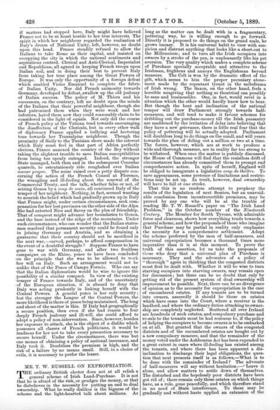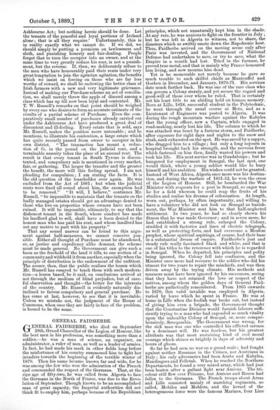MR. T. W. RUSSELL ON EXPROPRIATION.
ordinary British elector does not at all relish a general scheme of Irish Land-Purchase. It is not that he is afraid of the risk, or grudges the money, or that he disbelieves in the necessity for putting an end to dual ownership. What he really dislikes is the bigness of the scheme and the light-hearted. talk about millions. As long as the matter can be dealt with in a fragmentary, pottering way, he is willing enough to go forward. Directly it is proposed. to do things on the grand scale, he grows uneasy. It is his universal habit to view with sus- picion and distrust anything that looks like a short-cut to the Millennium; and to turn all the Irish occupiers into owners by a stroke of the pen, is unpleasantly like his pet aversion. The very quality which makes a complete scheme of Purchase specially acceptable and attractive to the Irishman, frightens and annoys the Englishman beyond measure. The Celt is won by the dramatic effect of the gift, which seems to him the proper pecuniary atone- ment made by the repentant tyrant in the melodrama of Irish wrong. The Saxon, on the other hand, feels a horrible misgiving that nothing so theatrical can possibly be sane and businesslike. One, in fact, would revel in a situation which the other would hardly know how to bear. But though the bent and inclination of the national temper will draw Parliament strongly towards half- measures, and will tend to make it favour schemes for dribbling out the purchase-money till the Irish peasantry are maddened by the irritation of delay into believing that they have a new grievance, there is little real fear that the policy of pottering will be actually adopted. Parliament will doubtless long to do things on the small, and will yearn towards the plan of doling out a million or two at a time. The forces, however, which are at work to produce a wide and thorough measure, are in reality far too strong to be withstood. When once the matter is publicly discussed, the House of Commons will find that the resistless drift of circumstances has already committed them to prompt and comprehensive action. In spite of herself, England will be obliged to inaugurate a legislative coup de thedtre. To save appearances, some pretence of limitations and restric- tions may be set up. In truth, however, dual ownership will have to fall at one stroke.
That this is no random attempt to prophesy the results of the legislation of next Session, but an unavoid- able conclusion from incontrovertible premisses, may be proved by any one who will be at the trouble of reading Mr. T. W. Russell's paper on " The Irish Land Problem," in the October number of the Nineteenth Century. The Member for South Tyrone, with admirable force and clearness, shows how everything tends towards a general scheme, and how the proposals of those who imagine that Purchase may be partial in reality only emphasise the necessity for a comprehensive settlement. Adopt the scheme preferred. by the men of half-measures, and universal expropriation becomes a thousand times more imperative than it is at this moment. To prove the truth of this assertion, let us take the proposals of those who deny that a universal plan of Purchase is necessary. They and the advocates of a policy of " thorough " agree in thinking that the congested districts must first be dealt with. Whether it will be wise to turn starving occupiers into starving owners, may remain open for discussion ; but there can be no doubt that only by getting rid. of the present system of dual ownership will improvement be possible. Next, there can be no divergence of opinion as to the necessity for expropriation in the case of encumbered. estates. If any tenants are to be turned into owners, assuredly it should be those on estates which have come into the Court, where a receiver is the landlord, and where the ordinary duties attaching to owner- ship are completely neglected. Scattered all over Ireland. are hundreds of such estates, and compulsory purchase and re-sale to the tenants must be had recourse to, if the policy of helping the occupiers to become owners is to be embarked on at all. But granted. that the owners of the congested districts and of the encumbered estates are bought out by a new compulsory measure, and that the remainder of the money voted under the Ashbourne Act has been expended to a great extent in cases where ill-feeling has existed among the tenants, and where there has been apparent a dis- inclination to discharge their legal obligations, the ques- tion that next presents itself is as follows,—What is to be done with the remainder of Ireland ? The advocate of half-measures will say without hesitation :—` Leave it alone, and allow matters to settle down of themselves. The disturbed and the hopelessly poor districts have been got rid of ; there remain only those estates on which things have, as a rule, gone peacefully, and which therefore stand in no need. of State interference. To these may be gradually and without haste applied an extension of the Ashbourne Act ; but nothing heroic should be done. Let the tenants of the peaceful and loyal portions of Ireland alone ; that is all they require.' Unfortunately, this is in reality exactly what we cannot do. If we did, we should simply be putting a premium on lawlessness and sloth, and punishing honesty and fair-dealing. People forget that to turn the occupier into an owner, and at the same time to very greatly reduce his rent, is not a punish- ment, but the reverse. If, then, we deliberately refuse to the men who have honourably paid. their rents under very great temptation to join the agrarian agitation, the benefits which we insist on forcing on those who are far less worthy of reward, we shall be endowing the better class of Irish farmers with a new and very legitimate grievance. Instead of making our Purchase scheme an act of concilia- tion, we shall merely throw the apple of discord among a class which has up till now been loyal and contented. Mr. T. W. Russell's remarks on that point should be weighed by every one who desires to form an accurate estimate of the results of a partial scheme of Purchase. Even the com- paratively small number of purchases already carried out under the Ashbourne Act have produced a great deal of discontent and ill-feeling. Every estate that is sold, says Mr. Russell, makes the position more untenable ; and he mentions, to illustrate his contention, a large estate which has quite recently passed from owner to occupier in his own district. " The transaction has meant a reduc- tion of es. in the pound on the judicial rent, and a terminable annuity takes the place of an annual rent. The result is that every tenant in South Tyrone is discon- tented, and compulsory sale is mentioned. in every market, fair, or gathering. The larger the transfer and the greater the benefit, the more will this feeling spread. I am not pleading for compulsion ; I am stating the facts. It is the old question of the leaseholder over again. He was excluded from the Act of 1881; but when the judicial rents were fixed all round about him, the exemption had to be removed." " It will, I believe," continues Mr. Russell, " be impossible to maintain that the tenants on the badly managed estates should get an advantage denied to those who live on properties whose owners have not been ruined. It will be impossible, ultimately, to say that the dishonest tenant in the South, whose conduct has made his landlord glad to sell, shall have a boon denied to the honest man who has paid his rent, and whose landlord has not any motive to part with his property." That any sound answer can be found. to this argu- ment against half-measures, we cannot conceive pos- sible. Either all thought of Purchase must be abandoned, or, as justice and expediency alike demand, the scheme must be made general. No Government can give such a boon as the freehold of the land it tills, to one section of a community and withhold it from another, especially when the principle of distribution is the endowment of the unfittest. The sooner, then, that the public realises the lesson which Mr. Russell has essayed to teach them with such modera- tion—a lesson based, be it said, on conclusions arrived at not through the medium of blind prejudice, but of care- ful observation and thought—the better for the interests of the country. Mr. Russell is evidently naturally dis- inclined to favour compulsory and general purchase. He has come at last, however, to see that it is inevitable. Unless we mistake not, the judgment of the House of Commons, when once they are fairly in face of the problem, is bound to be the same.







































 Previous page
Previous page